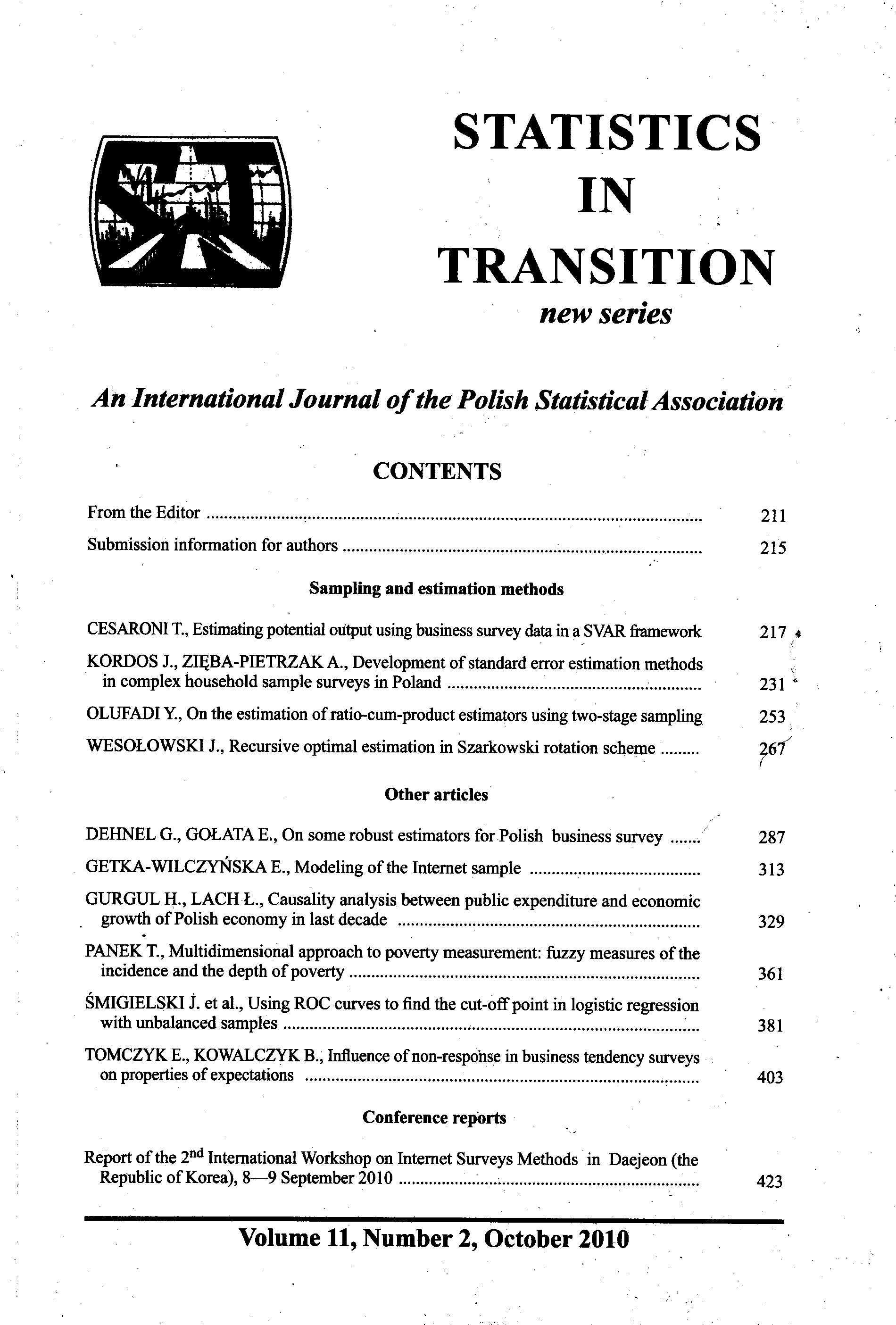ARTICLE
ABSTRACT
Expectations concerning key economic variables certainly influence decisions undertaken by economic agents. Since assumption of rationality forms the basis of neoclassical economic theory, question of whether expectations of industrial enterprises are indeed formed rationally deserves careful attention. Direct data on expectations are available mainly through business tendency surveys. Nonresponse problem is present in almost every survey, and much higher nonresponse rates are observed for expectations than for realizations. Weighting systems used to control for size of respondents may also introduce bias into expectations data derived from business tendency surveys. In this paper, we analyze two basic properties of expectations rational in the sense introduced by J. F. Muth – that is, unbiasedness and orthogonality – taking into account issue of non-response and weighting schemes. We propose several sample balance statistics to correct for changing sample structure that results from non-response; it depends on time, and is different from general population. We find that rationality of expectations of Polish industrial firms is not sensitive to these factors: independently from non-response and weighting issues, expectations concerning relative changes in production remain unbiased but not efficient with respect to freely available information.
KEYWORDS
expectations, rationality, tendency surveys, industrial production, non-response, weighting, survey data, qualitative data, post-stratification
REFERENCES
ANDERSON O. [1952] The business test of the IFO-Institute for Economic Research, Munich, and its theoretical model, Revue de l’Institut International de Statistique 20:1–17.
GUS [2008] Zmiany strukturalne grup podmiotów gospodarki narodowej w 2007 r. (Structural Change in National Economy in 2007), GUS (Central Statistical Office of Poland).
KOWALCZYK B., TOMCZYK E. [2008] Rationality of expectations of industrial enterprises – analysis based on business tendency surveys with item non-response, Bank i Kredyt 8:3–11.
LIU P. C., MADDALA G. S. [1992] Rationality of survey data and tests for market efficiency in the foreign exchange markets, Journal of International Money and Finance 11:366–381.
ŁYZIAK T. [2003] Consumer inflation expectations in Poland, European Central Bank Working Paper No. 287.
MUTH J. F. (1961) Rational expectations and the theory of price movement, Econometrica 29:315–335.
OSIŃSKA M. [2000] Ekonometryczne modelowanie oczekiwań gospodarczych (Econometric Modeling of Economic Expectations), Wydawnictwo Uniwersytetu Mikołaja Kopernika w Toruniu.
PESARAN M. H. [1989] The Limits to Rational Expectations, Basil Blackwell, Oxford.
RIED [2008] Business Survey, May, Research Institute for Economic Development, Warsaw School of Economics.
SÄRNDAL C., SWENSSON B., WRETMAN J. [1992] Model Assisted Survey Sampling, Springer-Verlag, New York.
SHEFFRIN S. M. [1996] Rational Expectations, Cambridge University Press, Cambridge.
THOMAS D. G. [1995] Output expectations within manufacturing industry, Applied Economics 27:403–408.
TOMCZYK E. [2001] Racjonalność oczekiwań respondentów testu koniunktury (Rationality of respondents of business tendency survey), in: E. Adamowicz (ed.) Analiza tendencji rozwojowych w polskiej gospodarce na podstawie testu koniunktury (Analysis of Development Tendencies in Polish Economy on the Basis of Business Surveys), Prace i Materiały Instytutu Rozwoju Gospodarczego nr 70, Warsaw School of Economics.
TOMCZYK E. [2004] Racjonalność oczekiwań. Metody i analiza danych jakościowych (Rationality of Expectations. Methods and Analysis of Qualitative Data), Monografie i Opracowania nr 529, Warsaw School of Economics.
TOMCZYK E. [2008 a] Analysis of expectations on the meso scale: uses of contingency tables, Warsaw School of Economics Research Grant No 03/S/0053/08.
TOMCZYK E. [2008 b] Racjonalność oczekiwań polskich przedsiębiorców: reguła czy wyjątek? Wnioski z testu koniunktury IRG SGH (Rationality of expectations of Polish entrepreneurs: rule of exception? Summary of results for RIED business conditions tests), in: E. Adamowicz (ed.) Koniunktura gospodarcza – 20 lat doświadczeń Instytutu Rozwoju Gospodarczego SGH (Business Conditions Surveys – 20 Years of the Research Institute for Economic Development, Warsaw School of Economics), Warsaw School of Economics.
